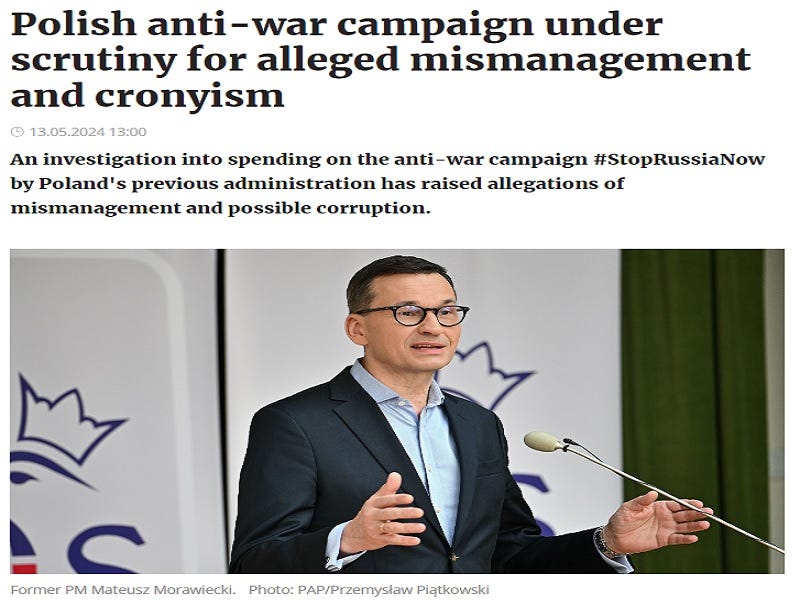Political Russophobia, not its ethno-bigoted manifestation that’s taken hold of Ukraine and other countries, is still an important issue for many Polish voters. To be sure, it’s not the main reason why they’d cast their ballot for or against any given candidate, but they certainly keep in mind a politician’s perceived attitude towards that country and accordingly judge their patriotism as a result.
State-run Polskie Radio reported on Onet’s report that the Supreme Audit Office is investigating the former conservative-nationalist government’s #StopRussiaNow campaign for alleged misappropriation of funds. According to them, the “Law & Justice” (PiS) party contracted this work out to companies connected to their members, which could possibly result in charges. This news coincides with returning liberal-globalist Prime Minister Donald Tusk’s months-long crackdown on the now-opposition.
The incumbent premier also recently demanded that his predecessor’s Russian influence commission from last summer be revived despite him vehemently opposing it at the time together with the West due to their claims that it was intended to smear his party. That selfsame commission’s report, which was published after PiS lost the elections, recommended that Tusk and other members of his previous two governments not be allowed to hold positions responsible for state security.
The pretext for his demand was the flight of a high-ranking judge to Belarus to seek political asylum for his critical views of Poland’s regional policies, particularly towards the NATO-Russian proxy war in Ukraine as well as what he claims is its subordination to the Anglo-American Axis and Germany. That individual was previously embroiled in a pro-PiS scandal during its time in power but then turned into a whistleblower who exposed this alleged influence operation.
This sequence of events is disadvantageous for that party since they combine to create the perception it wasn’t as opposed to Russia as it always claimed in spite of its leader Jaroslaw Kaczynski blaming Moscow for his brother’s death during April 2010’s tragic plane crash in Smolensk. The judge’s flight is being spun by Tusk as proof of him being a foreign agent whose treason was hitherto purposely ignored by PiS while Onet’s report suggests that this party never truly cared all that much about smearing Russia.
These perceptions are objectively inaccurate, however, since PiS is one of the most politically Russophobic parties on the planet. Under its rule, Poland unprecedentedly ramped up its military spending in pursuit of what Politico described as its plans to become “Europe’s coming military superpower”, which also saw it increase the number of US bases that it hosts. On top of that, PiS “de-Russified” the energy sector and turned Poland into NATO’s top logistics base for arming Ukraine.
On the social front, former Prime Minister Morawiecki boasted in March 2022 that Poland had set the global standard for Russophobia, which preceded him describing the Russian World as a “cancer” two months later that May. Although the Russian Ambassador to Poland told RT last month that “I can count on one hand the cases when such a negative attitude was expressed towards me personally” in a bigoted way, he still confirmed that political ties have deteriorated and many Poles fiercely hate his government.
PiS’ legacy therefore isn’t one of political Russophilia, but of political Russophobia, though Tusk wants to reshape popular perceptions of this ahead of next May’s presidential elections. The incumbent is a member of PiS and has the power to obstruct some of the ruling liberal-globalist government’s proposals, which is why the latter want to replace him with one of their own. To that end, they’re spinning everything they can to manipulate voters into backing their future candidate over PiS’.
This explains why Foreign Minister Radek Sikorski rebuked President Andrzej Duda for disclosing in an interview that he discussed Poland hosting US nukes during his latest trip to DC so as to portray him as irresponsible with the innuendo that he represents a national security threat like Trump supposedly did. Tusk’s government is also building up Poland’s border fortifications in order to present themselves as national security hardliners despite this being done on false pretexts for electioneering reasons.
Poland’s former Defense Minister under PiS exposed his predecessor’s alleged plans during Tusk’s prior two terms to withdraw the armed forces west of the Vistula in the far-fetched event of a Russian invasion, while the returning premier’s rule was characterized by a renaissance in ties with Russia. He and his government followed Germany’s lead in comprehensively improving relations with the EU’s energy-rich eastern neighbor, which PiS has since framed as supposed proof of Russian influence.
Political Russophobia, not its ethno-bigoted manifestation that’s taken hold of Ukraine and other countries, is still an important issue for many Polish voters. To be sure, it’s not the main reason why they’d cast their ballot for or against any given candidate, but they certainly keep in mind a politician’s perceived attitude towards that country and accordingly judge their patriotism as a result. For that reason, each of Poland’s top two parties have an interest in painting the other as pro-Russian.
PiS points to the German-influenced renaissance in Polish-Russian relations during Tusk’s previous two terms, while he and his supporters twisted their opponent’s conservative policies towards abortion, LGBT, and illegal immigration as purportedly being influenced by the Kremlin. They’re now building upon that earlier mentioned high-ranking judge’s flight to Belarus and Onet’s report about possibly impending corruption charges over the scandalous #StopRussiaNow campaign to reinforce their false claims.
Their latest information warfare narrative rings hollow though since the Polish security services went overboard if anything in trying to root out suspected Russian influence during PiS’ time in power while Onet’s reported corruption scandal impugns the individuals involved and not the party itself. Nevertheless, average Poles might be manipulated by this into seeing everything differently, which works against PiS’ electoral interests while distracting from Kaczynski’s claim that Tusk is a “German agent”.




